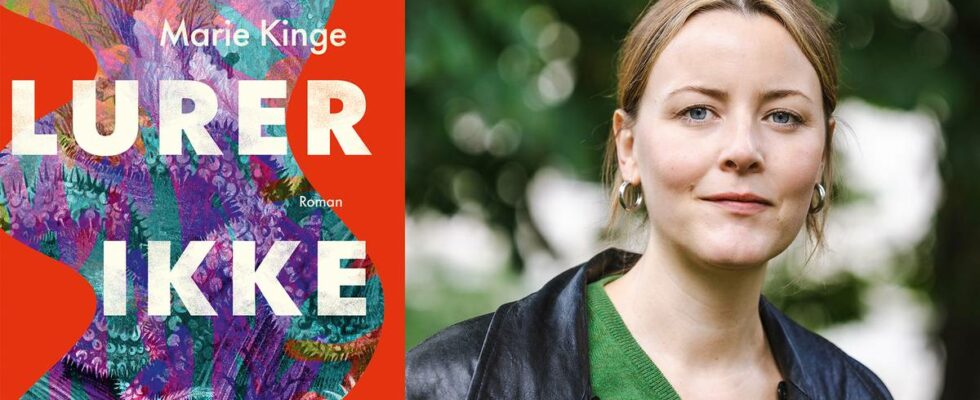Mira’s childhood consists of a basement full of drugs. A mother in the background, a grumpy grandmother out on the farm where no one has been happy, except maybe the birds. An older brother with a sense of fire, a younger brother with very bright curls – and then the father: temperamental and newspaper reader, robber, skilled vet, thirst for knowledge and fond of drugs. In the debut novel “Du lurer nik meg” we are drawn into scenes from growing up that take place in several places: on the rock, on the farm, at the kitchen table in the house in the city. And down in the basement where animals lie with their bellies open, sedated by drugs that can kill you. HAPPINESS AND UNHAPPINESS IN BOOK FORM: Difficult parents have created many an author. Marie Kinge (b. 1991) makes her novel debut with the story of a well-functioning and checkered father. Photo: Lina Hindrum What is it that disappears when a person disappears? Marie Kinge has written a sunny and shadowy portrait of a father-daughter relationship that turns out to be of the comradely variety. It is a laughable fraternization, which is also a sad joke. An atypical portrait Writing about happiness is more difficult than about unhappiness, said successful author and writing school teacher Kyrre Andreassen recently in “Trygdekontoret”. It is easy to believe him. Literature contains crises, disappointments and breakdowns more than anything else. When an author manages to immerse the reader in a golden mood, free of all-important sweeteners, it is worth recognizing. Marie Kinge has managed both: both happiness and misfortune. Because even though Mira’s father can roar that the children should never have been born, and go out on Christmas Eve so that the others have to scrape together a crunchy dry rice porridge for 13 guests, he is also a father who teaches his children to dive for crabs. Difficult parents have created many a writer. The relationship between father and daughter is less treated, especially in those where there is also warmth. A teenage daughter voluntarily keeping her father updated on her boyfriends, or her father toasting her first period without her wilting in embarrassment, is rarer. It is nice to see this friendship between child and parent. Friends should look out for each other. Mira finds her father knocked out many times throughout. Syringe tips are hidden all around. The vet’s medicine stock can slowly relieve “sore backs”. Not the feelings on the outside We get most of the child’s memories, then a few parts about the teenage years and some very short bits from early adulthood. We are racing toward an end that might not be good. The reminiscence is obviously triggered by his father’s death. What Mira wants with the memories is less clear. Mira is not in a mode where every stone should be turned over, she does not try to uncover or scrutinize. Still, there is wisdom here. The feeling of inadequacy and despair when a loved one perishes is not seen much. Here it is rather a kind of resounding silence. Not all grief is acutely upsetting, perhaps rather it slowly seeps through a lifetime. What I do object to is the somewhat confusing compromise between indentation and paragraphing. I think the form should save space, since Kinge writes in a way where she often starts over. And although it gives the effect of almost racing through the late teens – towards the end – it can also feel rushed and lacking. The absence of sentimentality and nostalgia makes the memories come alive, as if Mira really stands in the middle of the memory that is being painted: The writing is no consolation Sentimentality requires a contact with and a charge of emotions. It doesn’t seem like Mira has this connection at first, that she’s blunt or has no need to articulate her feelings. This is how the book differs from others of a similar nature, by presenting the idea that writing is not the medium of grief, that it cannot console. This is not a ready-made narrative, but an introduction to a material that leaves more questions than answers. “You don’t fool me” shows a solid ability to create moods and fill simple phrases with the fateful. And then it has a zing, which I like. news reviewer Photo: Cappelen Damm Title: “You’re not fooling me” Author: Marie Kinge Genre: Novel Number of pages: 224 Published: August 2024 Publisher: Cappelen Damm Published 26/08/2024, at 09.29
ttn-69
“You are not fooling me” by Marie Kinge – Reviews and recommendations

